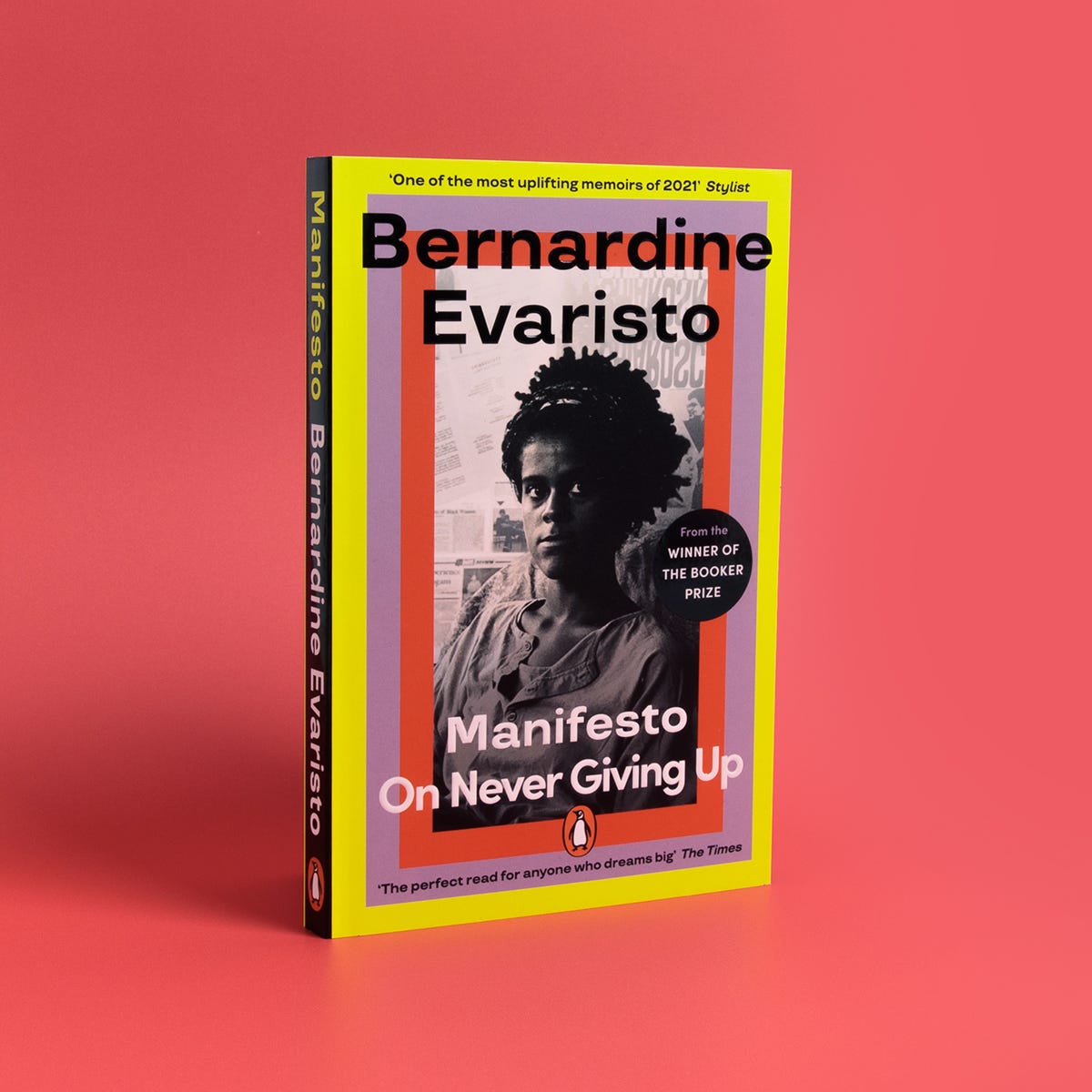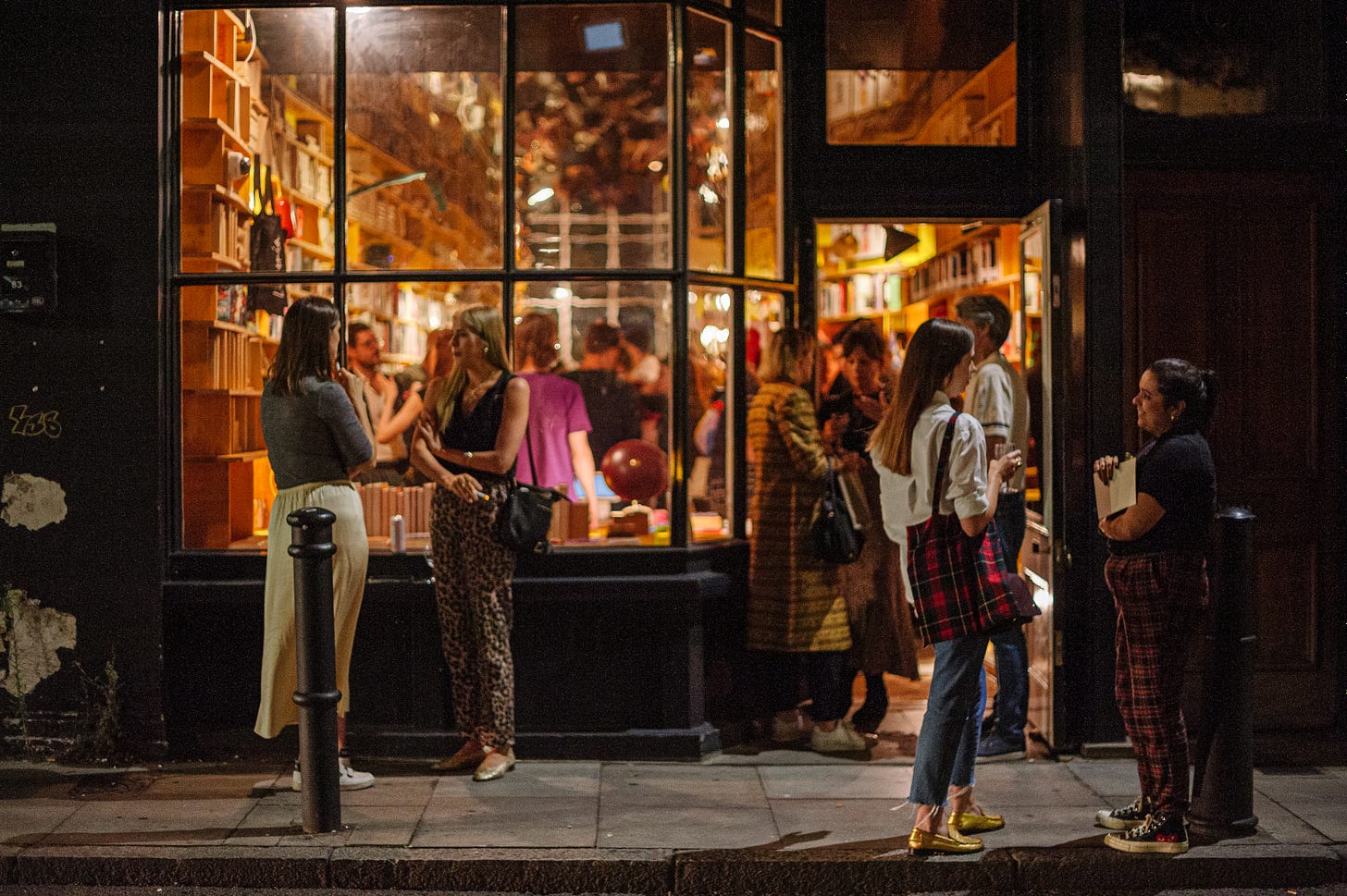Bernardine Evaristo on heritage and positive thinking
Some unseen bits from a new interview for Grazia magazine.
Paid subscribers can hear this newsletter as a podcast every week. Listen to this edition here.
There’s a bumper issue of Grazia magazine out in the UK at the moment, and inside it is an interview with Bernardine Evaristo, written by me. Bernardine is the author of eight books of fiction, including Girl, Woman, Other, for which in 2019 she won the Booker Prize (she was the first black woman to do so).
I found Girl, Woman, Other a funny, thought-provoking, joyous piece of work: I’d recommend it to anyone. I also really enjoyed Bernardine’s memoir Manifesto: On Never Giving Up, which comes out today in paperback – so it was exciting to go and meet her.
I’d love you to read the article in Grazia’s Big Fashion Issue (out now and for another ten days or so, but it may sell out). As always, I was limited on word count, so for today’s newsletter I’m going to share some interesting snippets of our conversation that didn’t make the magazine.
On heritage, Twitter and empathy
Bernardine’s father was black Nigerian; her mother is white British. In one of the most compelling parts of the memoir, she talks about how she and her siblings were treated as children in 1960s Britain (unsurprisingly, not well), and the pain of being rejected by some of her mother’s family. Her maternal grandmother stayed in their lives, but held racist views, and did not display photos of her grandchildren in her home.
Bernardine also writes about the research she’s done into her family tree, which shows that she has ancestors in the UK going back 300 years, and also has Irish, German and Portuguese heritage.
Did you get a lot out of delving into your mother’s family tree and understanding all the movement that had gone on there? Especially after your mother’s family was so cruel when she met your father.
I know, but that’s human behaviour isn’t it? People behave like that even though they themselves are descended from people who were once immigrants. I love the fact that I can trace back 300 years on my mother’s side of the family – that really excites me actually, because it shows that my roots are deeper in this country probably than they are in my father’s country in Nigeria. It flies in the face of this idea of somebody not belonging because of the colour of their skin, and that’s what I experienced especially as a child, that you didn’t belong in this country because you looked different to the majority.
I thought it was a very compassionate memoir. You talked about your grandmother being racist but also very loving. I was very touched by how forgiving and empathetic you are. Do you think that’s important to how you see life?
It’s interesting. People do think it’s forgiving and I don’t necessarily see it in that way… There are people who’ve really pissed me off today who I can’t imagine ever forgiving actually, and the same would have been the case with some of the people in my past, but as time moves on you have to let go, you know.
I have become probably more compassionate – because as a fiction writer, you have to understand your characters, you have to understand points of view that you don’t share, you have to understand human motivation, and so because I’ve been engaging with this now for 40 years, since I was first writing for theatre, it’s very hard for me to just accept surface behaviour. I have to try and understand what’s going on behind that, and I think as a society we need to become more compassionate. We do. Because people can be very cruel and heartless, especially those in government, and we need to extend our sense of humanity out to everybody in the world, especially people in this country and people who are trying to get into this country.
I’m interested that you’re on Twitter, because it’s not a particularly forgiving or empathetic environment. How do you manage it?
I have been trolled a few times and it’s shocking. I call them the rabid wolves of the Twittersphere, and I actually did that when I was trolled at one point and that made them even more angry - they just pounced even further. How dare you! I’m like, Well, if the cap fits!
I think Twitter for me has been very useful and mostly it’s been a really positive space, but I have to be increasingly careful about what I say on there. I’m full of opinions about society at large, but I try to keep it to the arts, to talking about my work, to talking about other writers and so on, and I try not to be part of any pile-ons, or to be one of these people who are permanently outraged at everything that’s going on. The two exceptions are Boris Johnson and Trump, so I have let rip on occasion with those two.
I don’t like the mob mentality and I don’t like the way people have become polarised through that platform and never really have to defend their positions. It’s very easy to have an opinion, to express it in 280 characters and not have a proper reasonable debate about something. Instead you just get all these opinions flying around, and what people have to say is often very superficial, you know, and it’s never really tested. You can appear like an expert on everything.
I think years ago, whatever was going on, whatever commentary I had about the political situation or whatever, I didn’t really express it to anyone except maybe the people around me, and it was confined. If I changed my mind it didn’t really matter because I wasn’t making a grand statement to thousands of people. I’m also an activist, and Twitter can be very useful there, but actually I’m most useful as a creative person, as an artist and putting my energy into my writing, rather than having an opinion about everything that’s going on in the wider world and commenting on it through Twitter every day. Some people do that, they’re almost never off it. I think it’s better for me to conserve my energy and focus it in my writing.
On the cost of living crisis and surviving as a creative
For a long time I’ve really felt for people coming of age in their twenties and thirties, because OK, it took me a long time to get a mortgage, but certainly in my twenties I lived very cheaply, and many of us did. We were able to get accommodation through housing associations and all other kinds of outlets. Sometimes it would be squats, you know, but it was very easy to be a young person, especially in the creative world, and to live in central London.
I lived in central London for a very long time. People in the arts, we could support ourselves because we were on the dole. We would earn a little bit of money and we could live in town, and I know now young people are having to move out of the city and that’s going to affect their working relationships and what they have access to and so on. So that’s something that’s been going on for twenty years or so, that the capital city has become unaffordable and even those places that were cheaper – because Londoners are now going out to the coast and so on in droves – they’re also going to shortly be unaffordable.
Then we have the cost of living crisis, which is shocking, and the energy bills that they’re telling us we’re going to get this year – most people can’t afford that. We’ve gone from one crisis to another to another – I consider Brexit an ongoing crisis, and then we have Covid which was a health crisis, and this terrible government is a crisis, and now we have the cost of living crisis, and what are people going to do? Who can afford £2000, £3000, £4000 energy bills?
On positive thinking
In her work, Bernardine is a great advocate for positive thinking and affirmations.
I don’t even call it failure – you just have to accept that you don’t always get what you want, and when you do experience those setbacks, learn to bounce back from them before you’ve allowed yourself to crash to the ground. I have known people who have a very negative mindset – who expect the worst, and then they get the worst and they’re devastated by it. My feeling is that if you expect the worst, you’re almost creating it in your mind. If I approach writing a book expecting it to be terrible, then it probably will be, because I’m not giving it 100% because I’ve already accepted defeat. Whereas if I approach writing a new book with the attitude that it’s going to be fantastic, it’s going to be great, I’m really going to enjoy the process – then I’m putting a lot of positive energy into the experience, and something exciting is going to come out of that.
To read more on this in particular, get hold of the new Grazia, in which Bernardine explains how she uses affirmations, and discusses fashion, migration and finding love in mid-life.
(If you’re wondering: yes, I am keen to get her on the podcast. She’s been on my guest wishlist for a long time. I am very persistent, and I have faith. POSITIVE ENERGY!)
On the topic of heritage, I want to quickly mention a newsletter that I discovered last week, when I met the writer Isabella Silvers at a get-together for Substackers in London. The photographer Jess Littlewood (robinstudios.com) actually captured us meeting in this picture – there we are on the right:
Isabella’s Substack is called Mixed Messages, and it’s a platform where she interviews actors, journalists, athletes, politicians and all kinds of other people about their experiences of being mixed race. She has had fantastic guests, she asks great questions, and I highly recommend it.
If you haven’t already, check out last Sunday’s In Writing Creative Club and let me know your feedback on the prompt I tried this week (and give it a go). That’s all for now – good luck with your writing this week!







Thanks for writing, Hattie! And sharing the extra bits of your interview with Bernardine Evaristo. It’s really interesting what she says about London. When French people ask me why I left London for Paris, I often explain that it’s inaccessible to live in the city centre and as a result of this, you can’t spontaneously meet up with your friends, and you’re paying a sort of time and energy tax to get anywhere. Interesting also what she says about the safety-net of the dole-equivalent support systems still exist here in France for artists and people working in creative fields. Then again, on the subject of diversity of backgrounds, there’s a whole other set of issues in Paris that London doesn’t necessarily have. Thought-provoking as ever, Madame!
Loved Girl, Woman, Other, I'm off to buy Grazia!